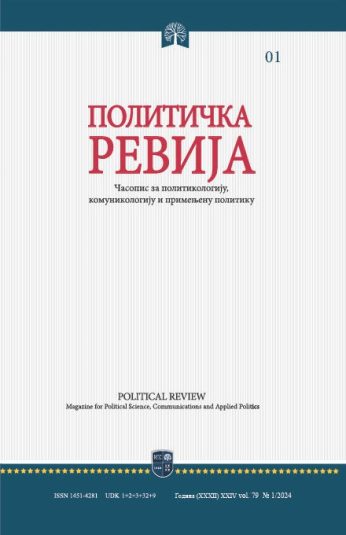Тема броја
ЕВРОПСКЕ ИНТЕГРАЦИЈЕ
ДОПРИНОС ЛИБЕРАЛНЕ ТЕОРИЈЕ МЕЂУВЛАДИНИХ ОДНОСА У ИЗУЧАВАЊУ ПРОЦЕСА ЕВРОПСКЕ ИНТЕГРАЦИЈЕ
Сажетак
Циљ овог чланка је да анализира допринос либералне теорије међувладиних односа у изучавању процеса европске интеграције, која подвлачи значај унутрашњег процеса преговарања између држава и недржавних актера, који одређују природу националних преференција, које државе затим следе на европском нивоу. Либерална теорија међувладиних односа сматра да међудржавно преговарање у оквиру ЕУ може довести до збира са позитивним исходом, као и да су националне преференције производ притисака домаћих учесника. Кључно становиште ове теорије је да процес европске интеграције јача моћ држава тако што повећава ефикасност међудржавног преговарања, услед постојања заједничког преговарачког форума и процедура за доношење одлука, али и јача аутономију националних политичких лидера у односу на домаће друштвене учеснике. Чланак ће бити подељен у два дела. У првом ће се разматрати основе либералне теорије међувладиних односа, и њен допринос модернизацији теорија интеграције и појашњењу еволуције европског интеграционог процеса. Други део ће се бавити предностима и недостацима ове теорије, сагледаним из угла у којој мери и колико ефикасно је ова теорија успела да објасни процес европске интеграције.
Референце
- Chryssochoou, Dimitris, Theorising European Integration, London, SAGE Publications, 2001.
- Dover, Robert, Europeanization of British Defence Policy, Ashgate, Aldershot, 2007.
- Fioretos, Karl-Orfeo, “The anatomy of autonomy: interdependence, domestic balances of power and European integration“, Review of International Studies, vol. 23, n° 2, 1997.
- Foster, Anthony, “Britain and the Negotiation of the Maastricht Treaty: A Critique of Liberal Intergovernmentalism“, Journal of Common Market Studies, vol. 36, n° 3, 1998.
- Garret, Geoffrey, Tsebelis, George, “An Institutional Critique of Intergovernementalism“, International Organization, vol. 50, n° 2, 1996.
- Hiks, Sajmon, Politički sistem Evropske unije, Beograd, Službeni glasnik, 2007.
- Hoffmann, Stanley, “Obstinate or Obsolete? The Fate of the Nation State and the Case of Western Europe“, Deadalus, vol. 95, n° 3, 1966.
- Hoffmann, Stanley, “Towards a Common Foreign and Security Policy?“, Journal of Common Market Studies, vol. 38, n° 2, 2000.
- Marks, Gary, Hooghe, Liesbet, Blank, Kermit, “European Integration from the 1980s: State-Centric v. Multi-Level Governance”, Journal of Common Market Studies, vol. 34, n° 3, 1996.
- Матић, Петар, “Будућност институционализма – процеси и промене у XXI веку“, Политичка ревија, вол. 24, бр. 2, 2010.
- Moravcsik, Andrew, “Liberal Intergovernmentalism and Integration: A Rejoinder”, Journal of Common Market Studies, vol. 33, n° 4, 1995.
- Moravcsik, Andrew, “Negotiating the Single European Act: National Interests and Conventional Statecraft in the European Community”, International Organization, 45, n° 1, 1991.
- Moravcsik, Andrew, “Preferences and Power in the European Community: A Liberal Intergovernmental Approach”, Journal of Common Market Studies, vol. 31, n° 4, 1993.
- Moravcsik, Andrew, “Why the European Union Strengthens the State: Domestic Politics and International Cooperation”, Center for European Studies, Working Paper n° 52, 1994.
- Moravcsik, Andrew, Schimmelfenning, Frank, “Liberal Intergovernementalism”, in Antje Wiener, Thomas Diez (eds.), European Integration Theory, Oxford, Oxford University Press, 2009.
- Moravcsik, Andrew, Vachudova, Anna, “National Interests, State Power and EU Enlargement”,http://www.ces.fas.harvard.edu/publications/ocs/pdfs/Moravcsik Vachudova.pdf.
- Pollack, Mark, “International Relations Theory and European Integration”, Journal of Common Market Studies, vol. 39, n° 2, 2001.
- Putnam, Robert, “Diplomacy and Domestic Politics: The Logic of TwoLevel Games», International Organization, vol. 42, n° 3, 1988.
- Rosamond, Ben, Theories of European Integration, New York, Palgrave, 2000.
- Schwok, René “Le rôle international de l’UE et les théories de l’intégration européenne”, in René Schwok, Frédéric Mérand (dir.), L’Union européenne et la sécurité internationale. Théories et pratiques, Academia Bruylant, Université de Genève, 2009.
- Станчић, Вишња, „Либерализам и демократија: сличности и разлике“, Политичка ревија бр. 2, Београд, 2010.
- Wallace, Helen, Caporaso, James, Schampf, Fritz, Moravcsik, Andrew, “Review Section Symposium: The Choice for Europe: Social Purpose and state power from Messina to Maastricht”, Journal of European Public Policy, vol. 6, n° 1, 1999.
- Wincott, Daniel, “Institutional Interaction and European Integration: Towards an Everyday Critique of Liberal Intergovernmentalism”, Journal of Common Market Studies, 33, n° 4, December 1995.

